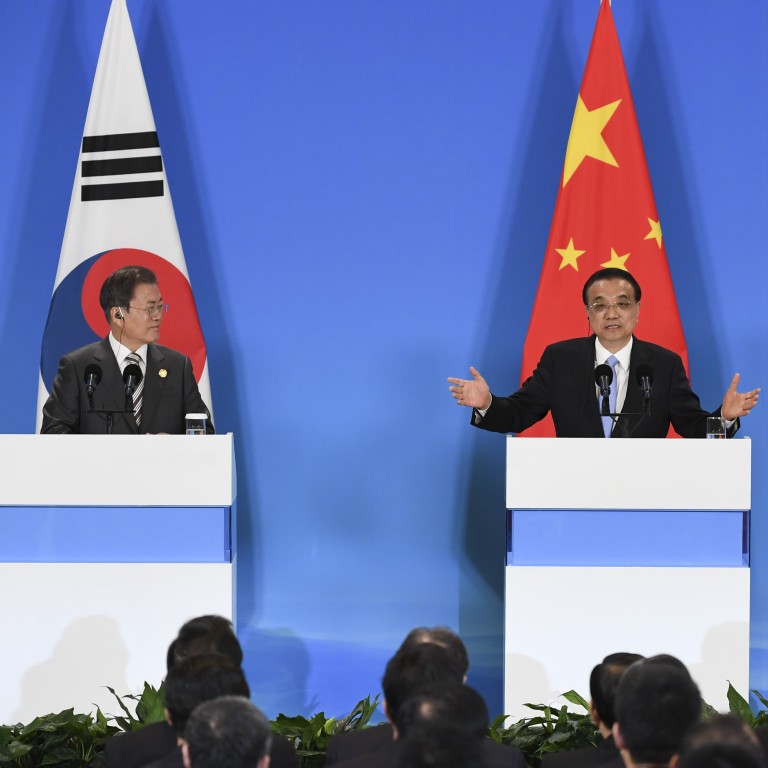
China, South Korea and Japan pledge cooperation on regional security as Pyongyang’s deadline nears
- Summit brings calls for unity, as North Korea grows impatient for US to change policy by the end of the year
- Trio will push to sign Regional Comprehensive Economic Partnership in 2020 and door is open for India to rejoin talks, Chinese Premier Li Keqiang says
Chinese Premier Li Keqiang hosted Japanese Prime Minister Shinzo Abe and South Korean President Moon Jae-in on Tuesday at the summit between the three countries in Chengdu, southwestern China, at a time of growing impatience from North Korea and troubled negotiations over the proposed Regional Comprehensive Economic Partnership (RCEP), potentially the world’s largest trade pact.
“For that purpose, it was confirmed that full implementation of UN Security Council resolutions remains important, and we need to maintain the momentum of the US-North Korea process,” Abe said, referring to talks between the US and North Korea that have stalled since June.
Pyongyang’s official Korean Central News Agency reported on Sunday that leader Kim Jong-un had held a party meeting to “bolster the overall armed forces of the country” to deal with the “fast-changing situation”.
China eager to break Japan-South Korea stalemate
Li said during Tuesday’s meetings that China hoped for a peaceful resolution to the issue of North Korea’s nuclear weapons, according to Japanese news agency Kyodo.
In a sideline meeting with the business community on Tuesday, Li said the three countries should avoid emulating the warring states in Romance of the Three Kingdoms, a 14th-century Chinese novel that draws on the history of a divided China around AD220-280. The book remains popular in all three countries.
Rather than adopt the “fighting and scheming” of the novel’s tales of state intrigue and deceit, the three countries should “absorb the wisdom and integrity” also found in the story, he said.
US eyes meeting with Japan, South Korea amid heightened tensions
Moon said the three countries shared a “common destiny” and had the “same dream” of promoting a “sustainable world”, as the leaders tried to smooth over conflict areas that also include trade imbalances between China and its neighbours.
The summit featured the first bilateral meeting between Moon and Abe for more than a year, although with little sign of a de-escalation in their disputes.
South Korean media reported that Moon had called on Abe to completely drop the export control restrictions, introduced after disagreement over how Japan should compensate Koreans for forced labour during the second world war.
Also on Tuesday, Li said during the business forum that all three countries supported the RCEP and had agreed that they would work together to push for the pact to be signed next year.
“Although there are deficits between China and South Korea and Japan, we will not engage in protectionism because of trade deficits,” Li said.
Without India, is ‘world’s largest trade deal’ still such a big deal?
The three countries should work together “to deal with the global economic downturn, achieve stable economic growth and accelerate the process of regional economic integration to inject new vitality [in the region]”, he said.
In a separate meeting between Li and Moon on Monday evening, Li said China had “left the door open” for India to rejoin at any time, according to South Korean news agency Yonhap.
Moon said the three countries should work more closely together to push for the pact. “The upheaval of the era of protectionism, climate change and the fourth industrial revolution is demanding more solid cooperation among our three countries,” he said.
Additional reporting by Associated Press

